Part one...begins...now.
"This is a culture without nuance, a people without irony."These words (as closely as I can recall...), spoken by a friend from across a glass-topped table in a small bar in mainland China, brought into focus the perceptions I was just beginning to develop during my first trip to a foreign country. It had already been a long trip for me, and it was only the second of 12 days that would be spent traveling between various cities and hotels in China, Hong Kong and Macau. It was my first passport, my first opportunity to explore the world beyond my own home country. And I was exhausted.
We sat with cocktails, obtained with much effort (and patience) from what appeared to be a 14-year-old boy behind the bar, observing a room full of presumably Chinese men and women dancing to the British-Chinese accent-tinged English lyrics of songs well known in the US. I watched as men cooled themselves with fans, assuming no pretense and indeed no irony, the women following the men's lead on the dance floor in a symphony of various ballroom-style dance moves. It was soothing in a sense, but I was jarred by the culture shock to a certain degree and it was then that my friend introduced his own take on the situation. Having traveled to the country more times than I could imagine, he knew this culture far better than I, and I appreciated the summation as an authoritative preview of what I could expect from our trip.
In the following days we traveled by car, taxi, train, ferry and airplane to areas that were intensely foreign to me. Each was distinctly different, yet all shared elements that laid bare my western-influenced naivete with regard to the world outside US borders. I've always believed myself to be easily adaptable to new situations, but the sense of wonder inspired by the scenes constantly unfolding before me was impossible to suppress. Not to mention it would be unlike me to attempt to do so.
For instance, I was aware that driving in other countries is very different, but I had no idea how incredibly terrifying it could be. No joke. Not unlike being in a real-life video game (memories of Pole Position as well as Frogger are easily conjured), I wondered how someone moving to China from elsewhere could ever hope to drive or ride a bicycle even a block without being killed. The lines dividing lanes are either absent or superfluous and horns are used instead of turn signals, often as a warning that any existing rules of the road are about to be ignored. I trusted my drivers; I had to, as the alternative would be to stand on the side of the road and wish myself to my destination.
Surviving only one minor accident during our entire stay, I chose to suppress any thoughts of my mortality in these situations, taking for granted that we would arrive unharmed wherever we were headed. Never mind the information imparted by one of our drivers that 300,000 people in China are killed in car accidents every year* (as compared to the, I think I was told, 38,000 in the US); we arrived safely everywhere we went and that was enough for me.
Much of our trips through the countryside and small towns was viewed through the window of a Jinbei, a smallish, tall minibus that could hardly be said to be comfortable but was not altogether unreasonable in its accommodations. Perhaps I am too forgiving after driving a Saturn with bad shocks for 4 years, but I was less bothered by these rides than others and it can't be denied that any discomfort was certainly mitigated by my interest in what was going on outside the car.
The medians and parks are meticulously maintained; such landscaping would surely command an exorbitant price in the US. Sculpted hedges, tropical plants, colors and shapes blended with nature in an artistic interpretation of God's intentions, these were well-placed as distractions from the rubble, tin shacks, garbage and dirty stores lining the streets just beyond their borders. As beautiful as the plant life is, the side roads and dwellings are equally opposite.
Imagine a hundred garages butted up right next to each other, filled with random assortments of everything you could imagine from car batteries to toilets to broken televisions, like so many giant shoeboxes storing odds and ends, and then a dump a year's worth of refuse onto the yards and broken concrete sidewalks and spray it all with the red dust of clay-infused soil. If you can assemble this image in your mind's eye, then you have a weak idea of just about every road in rural (and not-so-rural) China.
At night the neon signs, screaming whatever they're screaming in Chinese characters, almost blot out the glow of 16" televisions set up in the fronts of these stores, except that the crowds of anywhere from 10-50 people gathered around them draws one's attention back to a seemingly common nighttime activity. Well, that is if one can consider watching TV to be an activity.
I won't lie; I have 400 some odd channels on my 27" television, yet I only watch about 4 of them, and even that's only as a ridiculous panacea for insomnia. Half of my friends have plasma screens despite tens of thousands of dollars of debt. And the only time I watch anything on a screen with more than two other people is when I go to the movie theatre.
Needless to say, I had a difficult time processing what it was that drew these people like proverbial moths to the flickering light of their run-down sets. Perhaps they were watching the news, although I doubt it…and even if they were, the news in China is so censored, what "news" could they truly hope to glean? Perhaps it's as simple as an escape from their realities, much like what compels us as Americans to have a set in every room of our homes (not to mention computers with high-speed internet access). Either way, it left me with a feeling of embarrassment compounded by the guilt of immediately (and erroneously) judging their habits as a reflection of an inferior lifestyle. After all, it's not as if we, as westerners, are more highly evolved; we just receive more credit card applications in the mail.
All the same, ethnocentricity is difficult to shed, even willfully. And even such a realization does nothing to dampen its implications. I am still coming to terms with this.
*side note: "A report from the World Health Organization estimates that more than 600 lives are lost and more than 45,000 people are injured on China's roads every day." (meaning 219,000/year) They expect this number to increase to half a million per year by 2010, by the way. A similar report puts 2006 US auto deaths at 45,000 per year. So the numbers the driver gave us were a little off, but the magnitude remains the same…even if you take into account that US population is 298,444,215 (2006) and China's is, oh, 1,313,973,713 (2006). If you're going to get nitpicky about it, though, only 3 of every 1000 Chinese drive a car, but in the US almost 67% of the population drives (200,000,000 licensed drivers in 2005). So there. Suck it. I was still justified in being a leetle beet nervous.
****Yarg…So much more to follow…part two of this gazillion-part blog will exist once I'm finished surviving my jet lag (and cleaning my apartment). Maybe I'll put up some pictures in the near future…a slideshow thingy or something. Get excited.****
Subscribe to:
Post Comments (Atom)


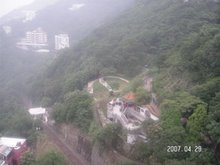
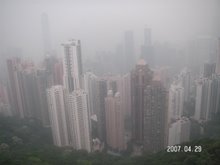

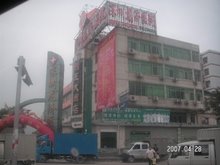

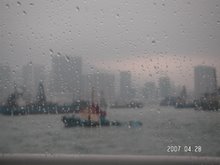
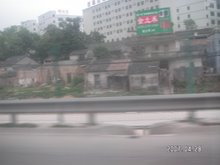
3 comments:
Emily,
Good to know that there are 98,444,215 people like me in the U.S. Of course more than half of those people are under the age of sixteen :(
oh d.lo, only a couple weeks left, right?? soon enough my friend, soon enough.
Thanks for writing this.
Post a Comment